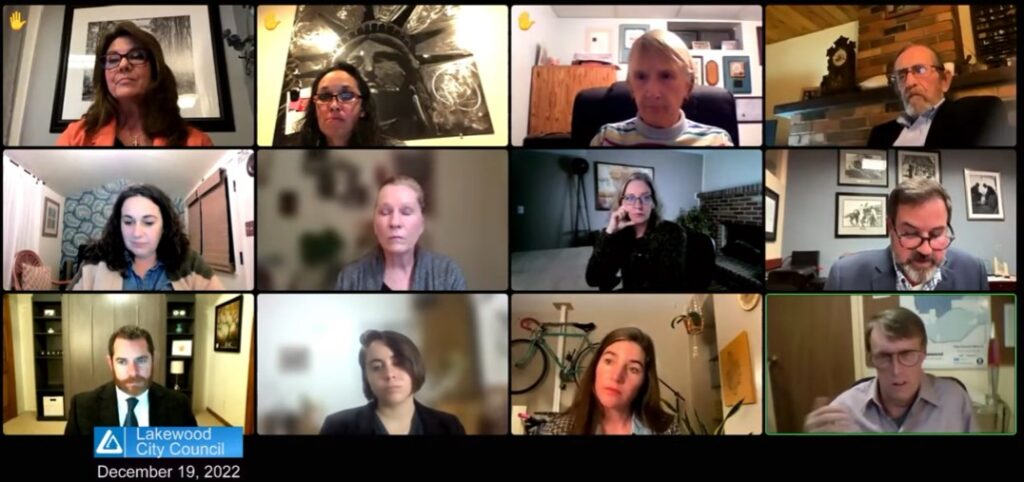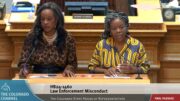By Jeffrey A. Roberts
CFOIC Executive Director
Three Lakewood City Council members are raising free-speech concerns after Mayor Adam Paul muted two of their microphones while they spoke during a Monday meeting on Zoom convened to consider changes to the city manager’s contract.
“You did not mute the other councilors who were singing her (the city manager’s) praises,” council member Rich Olver said to Paul during the 43-minute meeting. “You just want to mute the councilors who are not singing her praises.”

“That’s not true,” Paul responded.
Tension during the meeting stemmed from Paul’s intention, and the intention of six of the 10 councilors, to discuss City Manager Kathy Hodgson’s contract during an executive session planned for Dec. 5. That discussion instead happened online Dec. 19 — with the public watching — because four councilors voted against convening the Dec. 5 private session, with some saying they hadn’t been provided enough information to properly prepare for it. (Lakewood’s charter requires at least eight members to approve a motion for an executive session, which is allowable under the Colorado Open Meetings Law for personnel matters.)
Paul also muted the microphone of council member Charley Able during Monday’s meeting.
The mayor told the Colorado Freedom of Information Coalition he did so for three reasons: to maintain the council’s rules of decorum; to keep council members from straying from the agenda topic; and to make sure council members didn’t publicly disparage a city employee.
“It doesn’t have anything to do with content,” Paul said. “I’ve never not gone back to them and let them continue to talk — ever … I’m not taking away their speech.”
Able, Olver and council member Anita Springsteen told CFOIC they don’t see it that way.
“I told him he’s not just muting the council member, he’s muting the tens of thousands of people we represent in the city when he does that,” Springsteen said. “He always tries to hide behind his rights to keep decorum, but that’s not what this is about.”
Although Springsteen wasn’t muted during Monday’s meeting, a notice of claim she filed against the city Dec. 4 alleges the mayor has “repeatedly” muted her on Zoom. And she said the mayor interrupted her “right off the bat” during Monday’s meeting, which “has the same effect as muting.”
Able was muted, he said, while he “merely was explaining why I voted against that executive session. I was not given the information that I needed to prepare for that discussion. Thereupon the mayor muted me. Why? Because he didn’t want me to present information to the contrary.”
“That is politically silencing me,” Able added. “I am a city council person who has the right to speak. I was not being disrespectful to him or staff. How can a city council person function if the mayor has the right to say, ‘I don’t want to hear what you have to say and I’m not going to let anybody else hear it either.’ That’s the First Amendment issue here.”
CFOIC president Steve Zansberg, a media and First Amendment lawyer, said city council members’ First Amendment rights apply more to comments they make outside of their roles as council members, when they are speaking as citizens. A member’s speaking rights while serving on the council are more a matter of municipal governance law, he said, although “such on-the-job speech rights are also subject to non-content/viewpoint-free restrictions.”
“There is, however, an independent right of the people to receive the information that these council members, their elected representatives, wish to impart on subjects before the council,” Zansberg added. “The rights of the constituents to hear from their city council members is perhaps the stronger First Amendment right at stake here. Certainly, the mayor cannot exercise his mute button authority to silence any comment that disagrees with his position.”
Paul said he doesn’t do that to members of the city council.
“Their speech matters, whether I agree with it or not,” he told CFOIC. “And if you look at my record over my tenure as mayor … I really do try to accommodate.” He cited times that activist Eric Brandt, who is now serving a prison sentence for threatening a judge, called into meetings and said “the most horrific things ever.”
Zoom meetings are more difficult to control than meetings held in the council chambers, “where people are a lot more cordial,” Paul said. “But there have been times I’ve had to gavel out the meeting and take a break and let everybody cool down and come back.”
Before the mayor muted Olver on Monday, Olver had expressed his frustration about Able being muted and he had criticized the performance of the city manager, stating “we need a change at the top.”
A few minutes later, Springsteen said she was “extremely offended with the disrespect that the mayor is treating people with tonight … Muting people shows that you (the mayor) don’t want them to speak because you’re hiding something. You are trying to keep the public from hearing something. That’s not fair to anybody in our city.”
In an interview with CFOIC, Olver noted that a Lakewood policy and procedures manual directs council members to “avoid interrupting Council members who have the floor and withhold questions until the speaker yields the floor.” At one point during the meeting, he said, it went “back and forth,” with Olver unmuting himself and the mayor muting him again.
“I see the whole thing, truthfully, as revenge,” he said, “his (the mayor’s) revenge against us for not letting him have his executive session.”
Paul told CFOIC he understands the council members’ frustrations and he acknowledged they were raising some valid questions about the city manager’s contract, but Lakewood’s personnel rules require that such discussions happen in executive sessions.
“This is the problem with doing this (adjusting the city manager’s contract) in an open forum,” Paul said during Monday’s meeting. “Evaluations and other types of personnel discussions are limited to executive sessions to avoid the personal liability issues that arise from publicly making negative statements about an employee.”
The dissenting councilors had an opportunity “to express their concerns, to give their ideas” in an executive session, “and we were denied that opportunity,” the mayor added. “So that’s where we are at tonight.”
The city council voted 7-4 to approve adjustments to Hodgson’s contract, which included an increase in her compensation.
Follow the Colorado Freedom of Information Coalition on Twitter @CoFOIC. Like CFOIC’s Facebook page. Do you appreciate the information and resources provided by CFOIC? Please consider making a tax-deductible donation.




